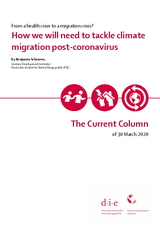From a health crisis to a migration crisis?
How we will need to tackle climate migration post-coronavirus
Schraven, BenjaminThe Current Column (2020)
German Development Institute / Deutsches Institut für Entwicklungspolitik (DIE), The Current Colum of 30 March 2020
Rising case numbers are highlighting how the coronavirus crisis is escalating, both globally and in Germany. Some people have already begun to ask themselves a delicate question: besides the medical and societal challenges brought on by the pandemic, could we also find new forms of cooperation? Might we also take a different approach to other global problems afterwards? The list of these global challenges runs from combating hunger and the climate crisis through to dealing with migration. Regardless of whether or not this optimism is justified, we cannot be allowed to lose sight of these long-term challenges; neither must we view them in isolation. In fact, we need to take the link between climate change and migration particularly seriously in view of the looming climate crisis. The academic and scientific community, but especially politicians and civil society too, have dragged their feet up until now and need to change course.
Scenarios in which several million “climate refugees” could soon be marching towards Europe have been around for a long time now. These fears have prompted the academic and scientific community to focus more on “climate migration” as an issue, with many large- and small-scale research projects on the link between global warming and human mobility being launched since the 2000s. The findings show that the climate change-migration nexus is much more complex than is generally assumed. Even in areas that have already been hit particularly hard by climate change, there are also economic, social and political reasons why people are leaving their home countries. It is now hard to say whether or not a migration process is “climate-induced” or even an example of “climate displacement”.
Often, a process of circular labour migration is involved, whereby individuals, rather than whole families, leave their homesteads, usually for a limited period of time. In some circumstances, the money earned can offset damage caused by climate change such as lost harvests. In other words, migration can also be an adaptation strategy to the adverse effects of climate change. Since it is primarily poorer population groups in the Global South that are affected, scenarios of a mass migration towards Europe sparked by climate change are somewhat unrealistic, as the vast majority of those concerned lack the necessary financial resources. Indeed, many people are so poor that there is nowhere that they could migrate to, even despite the worst ravages of environmental and climate change.
However, these findings are based on looking at the status quo. We have to assume that the impacts of climate change will make their presence felt increasingly keenly over the next 30 years and that land will disappear or become uninhabitable, particularly due to sea levels rise. At this point, we will also be highly likely to experience some completely new migration dynamics. Up until now, research into climate migration has largely focused on the question of what role climate change plays specifically in migration decisions and processes at this present time. However, it needs to change tack and look at the experiences gained and the specific “migration impacts” in the context of environmental and climate change. Ultimately, we also need to come up with better answers to conceptual questions of great political relevance, including, in particular, what forms of mobility could serve as an adaptation or coping strategy and under what circumstances. This will also require better interdisciplinary research, better links between different research methods or an analysis of large volumes of data (e.g. mobile communications data). Equally important are more long-term studies, as well as studies in countries and regions that have hitherto been largely ignored in terms of the link between climate change and (internal) migration – Europe included.
Of course, this will also need the support of policy makers. Although migration has been discussed at UN Climate Change Conferences since 2010 and there are also international initiatives addressing the issue, such as the Platform on Disaster Displacement, political and civil society actors from global down to local level have so far been too slow overall to formulate tangible measures to address climate-related migration. From a research perspective, we need a political mission statement in order to shape migration within – and beyond – the context of climate change. This should include preventing forced migration to the greatest possible extent, maximising the positive potential offered by migration (e.g. through regulations on the region-specific free movement of persons), and minimising risks and negative aspects such as human trafficking and migrant exploitation. Rather than seeking from the outset to suppress all forms of migration, actively embracing this mission statement at all levels and in all sectors of political life and civil society would be an effective way of dealing with climate migration. After all, you do not always need to wait for the crisis to strike first.
This Current Column is part of a special series that is exploring the developmental and socioeconomic consequences of the corona crisis. You can find more articles like this on The Current Column’s overview page.
- Coronavirus as an opportunity for international cooperation
- Why social protection is crucial in the corona crisis
- How we will need to tackle climate migration post-coronavirus
- Parallels between the corona pandemic and climate change
- What we can learn from and about Africa in the corona crisis
- How the EU and rising powers can shape their future sustainably
- How the corona crisis is calling into question the “right to the city”
- Is the coronavirus threatening a developing-country debt crisis?
- Is the pandemic deepening the digital divide?
- Tackling the pandemic without doing away with democracy
- How the international financial institutions are responding to the pandemic
- Assuring equitable access to COVID-19 vaccines and treatments
- The marginalised as the weakest link in pandemics
- Incentives and rules for fair supply chains
- From COVID-19 to climate action
- How to respond inclusively to COVID-19 in the interests of the common good
- Why the Corona crisis is particularly difficult for right-wing populist governments
- What does the EU recovery plan mean for the European Green Deal?
- Growing inequality can worsen the pandemic’s effects
- COVID-19 has not killed global populism
- A fundamental transformation of tax systems is needed in the wake of Covid-19
- Germany’s EU Council Presidency faces a monumental task


